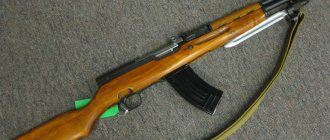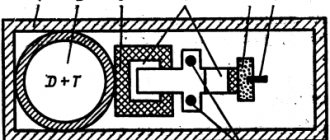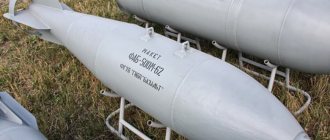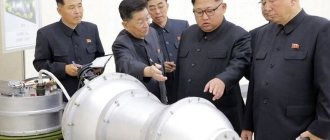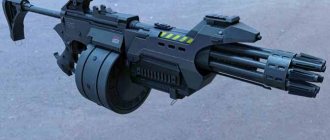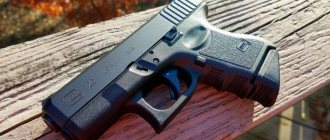Order or decision of the commander (chief)
In Part 3 of Art. 13 of the Criminal Code contains the procedure for the use of weapons by an authorized subject personally. In addition, the norm defines provisions according to which commanders have the right to order the use of it by subordinates when necessary to protect health, property and life under conditions of extreme necessity and defense.
Similar instructions are present in Part 4 of this article. Similar provisions are contained in the Federal Law regulating the activities of internal troops. The use of pistols, machine guns, etc. by order of the superior (commander) must be carried out primarily in accordance with the requirements of Art. 42 of the Criminal Code. In addition, the decision to use a weapon may only indicate the start of fire.
Responsibility for the validity of its use lies with the individual performer. It should be noted that in the above Federal Law a decision is made regarding the start of opening fire. In Part 3 of Art. 13 of the Charter talks about the order. In the latter case, there is a certain shift of responsibility for the validity of the use of weapons onto the superior (commander), without removing it from the executor when he realizes the likelihood of the illegality of the order.
Similarities
The similarity between application and use lies in the fact that one is impossible without the other. After all, in order to use a weapon, that is, shoot, you need to use it, that is, carry it with you, take it out, aim, etc. To use means to interact with the weapon, right up to its use. But the concept of applying has rather narrow boundaries of understanding. And this will be their main differences.
Detention
The use of firearms is permitted against a person who is resisting. In this case, one condition must be met. The subject must offer armed resistance. Officials may detain a citizen who refuses to comply with their demands. A pistol, machine gun, etc. can be used if a citizen is armed and does not want to voluntarily surrender his weapon. This situation is, by all appearances, similar to the detention of a subject who has committed a crime.
The very fact of illegal armament and resistance can be qualified as a criminal offense. According to Art. 38 of the Criminal Code, the purpose of detention is to deliver a citizen to specially authorized bodies (law enforcement) and to suppress the commission of new crimes by this subject.
According to the norm, causing death is not permitted under any circumstances. With a more in-depth analysis, one can find that armed resistance, which turns out to be a detained person from the moment the opposition to representatives of law enforcement agencies begins, is transformed into an assault. It contains a threat to the life of an official. Accordingly, a condition for necessary defense arises. At the same time, the presence of a weapon in the person being detained, even if he does not use it at the time of suppression of his actions, can be considered a sufficient basis for appropriate retaliatory actions that could lead to his death.
Weapons law
The normative act contains regulations that apply to citizens of the country. First of all, persons can use weapons that they have legally to protect property, health, life in extreme cases and in necessary defense.
Before using it, a citizen is obliged to warn the subject against whom it is directed about the actions that he is going to commit.
Expert opinion
Antonov Viktor Sergeevich
Practicing lawyer with 8 years of experience. Specialization: military law. Recognized legal expert.
The exception is situations where delay creates an immediate threat to people's lives or can provoke other serious consequences.
know the availability of personnel in the battalion units, keep records of the service time of military personnel undergoing military service under a contract, the time they are involved in the performance of military service duties in excess of the established duration of weekly service time, as well as providing them with an additional day of rest (rest time);
prepare and promptly send to the regiment headquarters information on the number of additional days of rest added to the main leave of military personnel serving under a contract, as well as on time not counted towards the period of military service (for military personnel undergoing military service on conscription), and others necessary reports.
Deputy battalion commander
organize timely washing of underwear and bed linen, towels, foot wraps (socks) and sanitary equipment in the laundry;
ensure compliance with safety requirements during the operation of technical equipment and compliance with sanitary requirements at service facilities;
check at least once every two months the presence (according to the regiment’s registration data) and condition of clothing and household property in the divisions and warehouses of the regiment, as well as the conditions of its storage and conservation.
Commander of a separate battalion (ships of rank 2 and 3), deputy commanders of a separate battalion and heads of services
Additionally
The law establishes prohibitions for gun owners regarding their carrying. In particular, it is not permitted if:
- The person is intoxicated.
- The subject participates in a meeting, rally, procession, demonstration, picketing, religious ceremony or rite, sports, cultural, entertainment or other public event.
There is an exception for the last case. This rule does not apply to:
- Persons who directly participate in competitions using sports weapons.
- Cossacks who are at meetings of their societies, participating in religious ceremonies and rituals, cultural and entertainment events associated with the mandatory wearing of a national costume, in territories where the presence of bladed weapons is an integral part of it.
- Subjects authorized to ensure public safety and order of citizens.
Persons acting as organizers of cultural, sports and entertainment events have the right to temporary storage of weapons belonging to citizens in the manner prescribed by the Federal Law.
Defense against attack
The use of firearms by the police is permitted if there is a threat to the life or health of citizens, both civilians and those in the ranks of the Armed Forces. At the same time, it must be stated that it is impossible to protect these persons by other means.
The regiment duty officer is Captain Korolev.”
The regiment duty officer immediately reports the arrival of the listed persons to the regiment commander or the person replacing him.
In the case when the arriving commander (chief) is met by the regiment commander and reports to him, the regiment duty officer only introduces himself.
If generals and admirals not listed in this article, as well as senior officers from a military unit other than their own, arrive at the regiment, the regiment duty officer only introduces himself to them.
For example: “Comrade Major General. The regiment duty officer is Captain Petrov.”
Then he accompanies them to the regiment commander or his deputy.
Other military personnel not from their military unit, after determining their identity and purpose of arrival, if necessary, are admitted to the regiment using one-time passes.
Assistant Regimental Duty Officer

